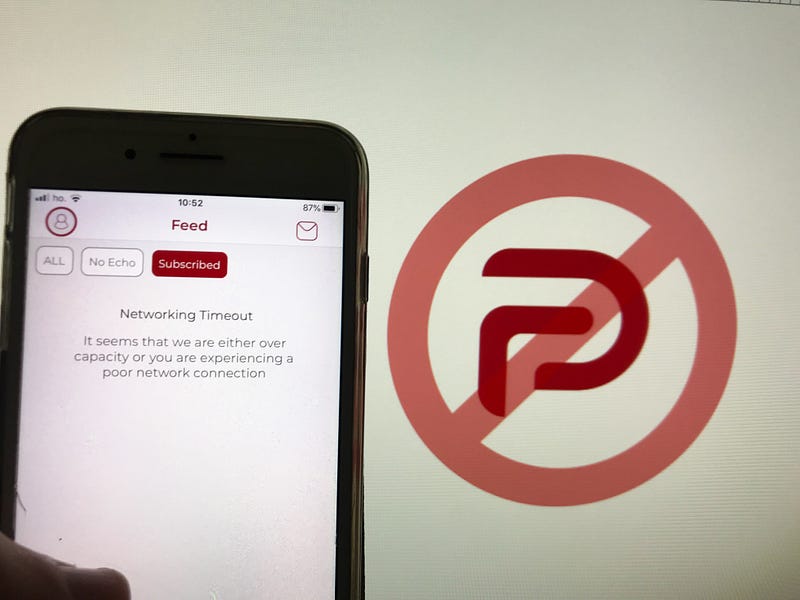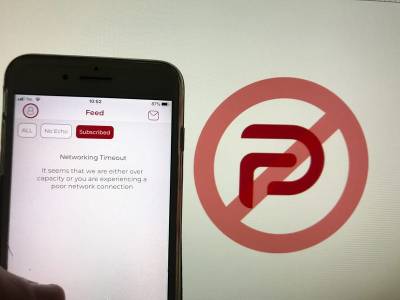The social media platform Parler launched in 2018 as an alternative to Twitter, aimed mostly at users who believe that other social media outlets censor conservatives. Founder John Matze promised that the site would be dedicated to free speech, and its community guidelines state that “our mission is to create a social platform in the spirit of the First Amendment to the United States Constitution.”
The “spirit of the First Amendment” phrasing is a dig at Twitter, which has long banned users for content that violates its terms of service. In 2016, Twitter banned Milo Yiannopoulos for repeated violations, including racist posts directed at comedian Leslie Jones. In 2018, the site banned “proud Islamophobe” Laura Loomer. And, of course, President Donald Trump lost his Twitter account on Friday night.
Now, after users used the platform to incite violence leading up to and during the storming of the Capitol and advanced unhinged claims about covert operations to keep Trump in the White House, Parler finds itself homeless. Warnings to the company to implement policies to better moderate its own content were largely ignored. Parler removed a post last week from Lin Wood, the pro-Trump lawyer and conspiracy theorist, after Wood called for the execution of Vice President Mike Pence. “Get the firing squads ready. Pence goes FIRST,” Wood posted. It was too late. On Friday Google removed its app from the Google Play store; Apple followed suit the next day. Users could still access Parler via a web browser, but just before midnight Sunday, Amazon Web Services cut off the site’s access to its servers.
“Across the internet stack, from the edge providers like Twitter, Facebook, Parler, down to infrastructural levels, app stores, web services, domain name services, everyone likes to govern their services as they see fit,” says Will Duffield, a policy analyst in the Cato Institute's Center for Representative Government, where he studies speech and internet governance. “These terms of services are pretty broadly drawn to potentially exclude future misbehavior. This is right in Parler’s terms of service as well, and probably what, despite their commitment to free speech or a First Amendment inspired standard, and what they would turn to if Lin Wood complained about their removal of his account the other night.”
Indeed, Parler’s user agreement even stated that “Parler may remove any content and terminate your access to the Services at any time and for any reason.” There is ample evidence that Parler exercised its own First Amendment right to do just that, long before it had to contend with Lin Wood. In a June 2020 post, Techdirt highlighted tweets from people who said they’d been kicked off the platform. About the same time, founder Matze posted on Parler that, yes, the service had banned users, with a request that people not post photos of “fecal” matter or spam other users. News accounts of Parler banning users picked up again in November, as the site was flooded with new members in the wake of the election.
Nationalist conservatives, led by President Trump, have long railed against Section 230, the clause of the Communications Decency Act that protects sites from being sued for third-party content. Trump even vetoed the National Defense Authorization Act in part because Congress refused to include Section 230 reform. (Congress overrode the veto.) That these arguments often represent, at best, a misunderstanding of 230 and that the reforms sought would actually lead to more moderation and regulation by social media companies—as The Dispatch’s Scott Lincicome has argued—tends not to matter to critics.
These complaints often center around individual users having posts taken down or their accounts suspended for violating a site’s terms of service. Because not only does Section 230 prevent sites from being sued for third-party content, it protects their right to remove content as they see fit. (Lincicome discusses that here.) It might feel different when Twitter or Facebook (or, ahem, Parler) boots an individual user than it does when Apple or Google denies a company access to its services, but the philosophy is the same.
“We shouldn’t be treating this as some kind of incredible novelty,” says Julian Sanchez, also of the Cato Institute, where he studies technology, civil liberties and national security. “This is not the first time an application or platform has been told ‘Take a hike, your content is not compatible with our acceptable use policy.’ Apple and Google remove apps all the time. Amazon Web Services is a little more unusual, but they have kicked off Wikileaks in the past. There was a similar platform called Gab that found itself rejected by both hosting providers and payment providers after the synagogue shooting where the perpetrator was found to have been effectively previewing his actions and issuing manifestos on Gab. Companies understandably said, ‘We don’t want any part of this.’”
Its pledge not to police users’ content made Parler a friendly environment for extremists and QAnon supporters. But in the months since the election, users promulgated baseless claims of election fraud, and the rhetoric escalated as we inched closer to inauguration, culminating in posts like the one from Lin Wood.
In response to a request for a statement from The Dispatch, a representative for Amazon Web Services pointed us to a BuzzFeed News article that included a letter AWS sent to Parler:
“Recently, we’ve seen a steady increase in this violent content on your website, all of which violates our terms,” the email reads. “It’s clear that Parler does not have an effective process to comply with the AWS terms of service.”
It’s not just prominent figures who use the platform to threaten violence or spread conspiracy theories. The Twitter account Parlertakes has tracked Parler since shortly after its launch, and its feed is full of posts like this:
One interesting aspect is how the response of Parler founder Matze to the current situation differs from that of Dan Bongino, an outspoken right-wing activist and an investor in Parler. Here is Matze’s final message to Parler users before the site went down.
“Look at the response from Parler,” Sanchez told me. “They didn’t say ‘We’ve been denied hosting by Amazon. No way for us to exist.’ They’ve said, ‘Now we have to host ourselves. We can’t do that quickly. We’ll be shut down for a month, and that’s damaging.”
However, Bongino in a Monday morning appearance on Fox & Friends called the battle an “existential fight”:
“Facebook and Twitter … they are allowed to pull down or leave whatever they want, and they are immune from lawsuits due to 230. But when Parler, which is not a surveillance platform, abides by the very same text of the law, 230, Parler is wiped from the face of the earth.”
What activists like Bongino want is for the government to regulate social media companies to enforce “viewpoint neutrality.” One argument is that Google, Facebook and others have become so culturally dominant their services are essentially public squares.
California GOP Rep. Devin Nunes called for government action against Big Tech in a Fox News appearance Sunday.
“Republicans have no way to communicate. … If you don’t want to be regulated by left-wingers that are at Twitter and Facebook and Instagram, where you get shadowbanned and nobody gets to see you, they get to decide what’s violent or not violent, it’s preposterous. So I don’t know where the hell the Department of Justice is at right now, or the FBI. This is clearly a violation of antitrust, civil rights, the RICO statute—there should be a racketeering investigation.”
Sanchez dismissed that argument fairly quickly.
“None of these platforms are the only place you can express yourself. There are ample other avenues to speak,” he said. “The New York Times used to be one of the primary news sources. You’d have a much stronger case going back to the 70s, saying that there were three main networks and they all have government licenses. To the extent that people thought they were under an obligation to be evenhanded when presenting viewpoints, that was called the Fairness Doctrine. It was justified to the extent that these were private entities using scarce government licenses. Conservatives correctly condemned it.”
Parler may, as Matze hopes, find a new company to host it. Maybe it adapts its terms of service to the satisfaction of Apple and Google. Whether it does or doesn’t, its adherents aren’t going away. And the sites to which they are headed face many of the same problems.
Duffield talked about where they might go next. He cited TheDonald.win, a former subreddit—meaning a subsection of Reddit focused on a specific topic—that is now its own site and home to many of the same people who use Parler. He also discussed chat apps like Telegram and Discord.
“This is to some extent a new or emerging dynamic, where the pressure to moderate flows back along the infrastructural stack. Once you create an alternative to the now more tightly moderated Twitter or Facebook, the only way to compel moderation of that alternative property is by going to their infrastructure providers,” Duffield said. “The focus on Parler—they aren’t the only platform with flawed moderation or even an architecture that would allow people to plot on their platform. … Telegram and Discord have similar problems for different reasons. I don’t know if the worm will turn toward them as time goes on, or if this is mainly tied to how loudly Parler has been associated with Trumpworld.”






Please note that we at The Dispatch hold ourselves, our work, and our commenters to a higher standard than other places on the internet. We welcome comments that foster genuine debate or discussion—including comments critical of us or our work—but responses that include ad hominem attacks on fellow Dispatch members or are intended to stoke fear and anger may be moderated.
With your membership, you only have the ability to comment on The Morning Dispatch articles. Consider upgrading to join the conversation everywhere.